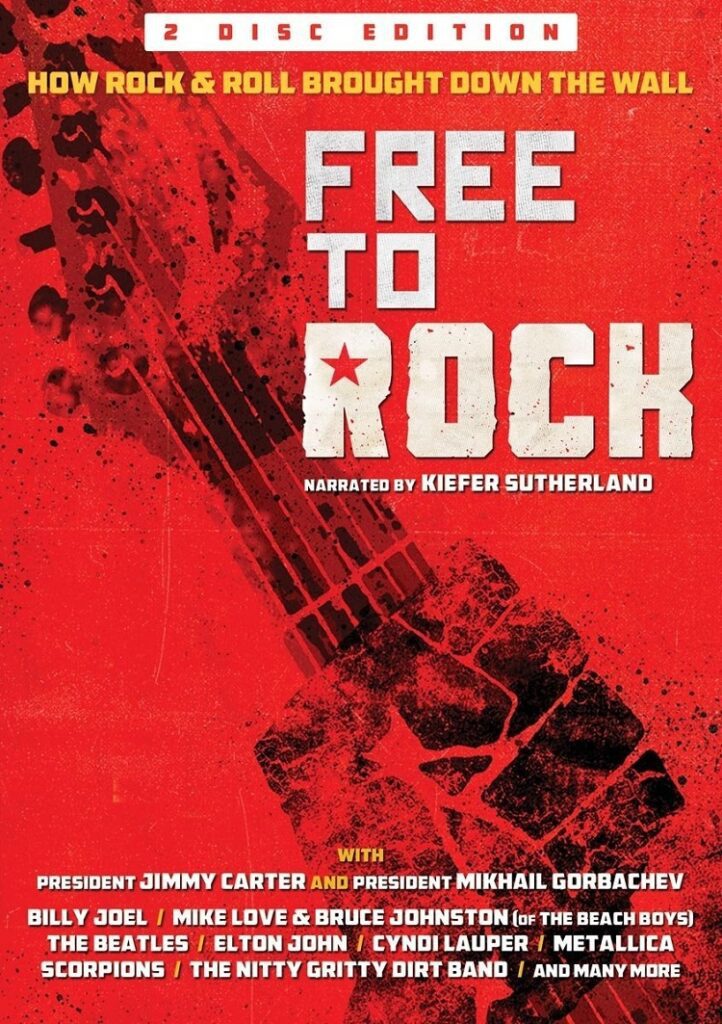
“Freedom’s just another word for nothing left to lose,” Janis Joplin sang in “Me and Bobby McGee.” For teens living behind the Iron Curtain in the 1950s, rock itself became a symbol of freedom. The documentary Free to Rock explores the role the rebellious music played in ending the Cold War, ending with the Berlin Wall coming down in 1989. Through interviews with Western musicians as well as Russian artists, the film makes the case that rock ‘n’ roll’s attitude changed culture and helped bring about changes that reverberate today.
Executive producers Nicholas Brinkley and Douglas Yeager spent ten years researching the film and interviewing Russian musicians, some of whom immigrated to the United States in the 1970s. What results is an hour-long overview of how teens furtively listened to Elvis Presley and later the Beatles (one Russian artist called the latter “the start of a new religion”) despite the fact that such artists were banned in communist countries. Some were inspired to form their own bands, often risking the wrath of the government. Rock transformed into more than just music; it became a symbol of Western culture and values, and led to challenging the communist regime. As musician Yuri Valov stated, “America was like something close to heaven. Russia was incredibly closed society. It was like a jail. And rock and roll was starting to open it.”
In addition to Russian musicians, Western artists such as Billy Joel, members of the Nitty Gritty Dirt Band, and the Beach Boys’ Mike Love and Bruce Johnston all discuss when they performed in front of enthusiastic audiences at a time when the Berlin Wall still stood; before Joel, bands were even forbidden to use electric instruments in their concerts. Yet all were moved by the fans’ genuine affection for America in general as well as its music.
Former President of the United States Jimmy Carter and past Russian President Mikhail Gorbachev contribute convincing arguments for how rock contributed to a political movement that ultimately ended communism. “Rock & Roll was a way to express their views and criticize the government . . . demanding change,” Carter stated, while Gorbachev (who seemed deeply influenced by the genre) concurred. “Rock is for young people,” he said. “It’s an opportunity to open up a road into the future.”
Members of Soviet groups such as Flowers and the Plastic People of the Universe tell horrifying stories of being arrested and even tortured for performing Western covers or their own compositions. Musician Pete Anderson tells a terrifying story of having his infant daughter’s life threatened and enduring a severe beating, simply for playing rock songs. Interestingly, the communist government eventually understood the power of the musical genre, essentially establishing their own artists who would perform pre-approved lyrics. Acceptable topics included love or love of the government; an especially fascinating anecdote includes the story of Dean Reed, an American-born singer/guitarist/actor who became the “Elvis of Russia” through his government-approved songs.
Free to Rock tells a hitherto unknown part of history—at least to American audiences—but the hour-long format barely scratches the surface. A longer film would have revealed even more important elements of the story. Hearing more music from the Russian bands would have further enhanced understanding of their struggle and bravery. The filmmakers essentially end the story in the early 1990s, but what about today? What role does rock play in Vladmir Putin’s Russia? Sixty minutes do not reflect the ten-plus years the filmmakers spent on the topic, and a longer documentary would have more thoroughly explored this important and still relevant subject. A second DVD filled with extra interviews suggests the material that should not have not been left on the cutting-room floor.
Yuriy Shishkov, a Fender custom guitar maker from the Ukraine, accurately summed up rock’s roll in leading a modern revolution: “the electric guitar was the symbol of freedom for us.” To paraphrase Joplin, these fearless artists risked their lives, perhaps because they felt they had “nothing left to lose.” Free to Rock hints at this intriguing journey, but leaves out too much essential information in the final cut.